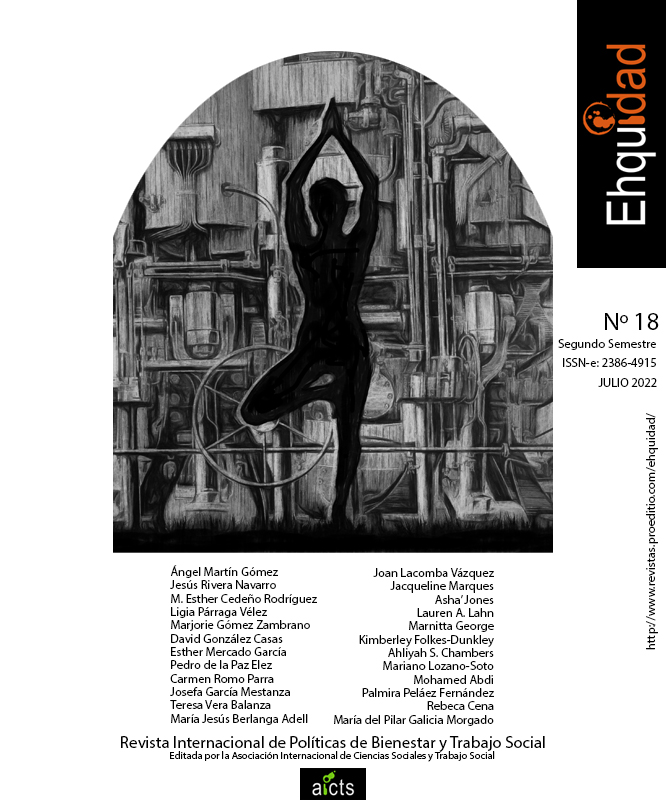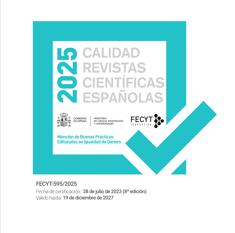Finding Our Compass: Students of color navigating a doctoral program during a time of political, racial, and social upheaval
DOI:
https://doi.org/10.15257/ehquidad.2022.0017Keywords:
Social justice, Reflexivity, Testimonials, Equity, LatCritAbstract
We use a storytelling approach in this study to convey our experiences as graduate students managing the triple pandemic of COVID-19, social unrest, and the mental health of doctoral students of color. We use the analytical practice of storytelling through testimonios to investigate how we navigate higher education institutions while enhancing our positionalities in the face of structural barriers and social challenges. We talk about our encounters with racism, discrimination, and power structures to demonstrate the influence of political and social pressures that exist as we navigate the doctoral program. We believe that if higher education administrators and educators are aware of the experiences of students of color navigating the laberinto of PhD programs, they can develop curriculum and support structures to help doctoral candidates thrive.
Downloads
References
Ahlers, A., & Arylo, C. (2019). Reform Your Inner Mean Girl: 7 Steps to Stop Bullying Yourself and Start Loving Yourself(Reprint ed.). Atria Books/Beyond Words.
Alba, A. L. del. (2007). Telling to live: Latina feminist testimonios. Duke University Press.
Alfaro, C. & Bartolomé, L. (2017). Preparing Ideologically Clear Bilingual Teachers: Honoring Working-Class Non-Standard Language Use in the Bilingual Education Classroom. Issues in Teacher Education. Volume 26, Number 2, Summer 2017.
American Council on Education (2019). Race and Ethnicity in Higher Education: A Status Report [report]. U.S. Department of Education. https://www.equityinhighered.org/indicators/enrollment-in-graduate-education/race-and-ethnicity-of-u-s-graduate-students/
Anzaldúa, Gloria. (2002). Now Let Us Shift...the Path of Conocimiento...Inner Work, Public Acts. Routledge. 540-57.
Artress, L. (1996). Walking a sacred path: Rediscovering the labyrinth as a spiritual practice. Penguin.
Au, W. (2017). When Multicultural Education Is Not Enough. Multicultural Perspectives, 19(3), 147-150.
Baker, R., Dee, T., Evans, B., & John, J. (2018). Bias in Online Classes: Evidence from a Field Experiment. CEPA Working Paper No. 18-03. Stanford Center for Education Policy Analysis.
Banks, T. & Dohy, J. (2019). Mitigating Barriers to Persistence: A Review of Efforts to Improve Retention and Graduation Rates for Students of Color in Higher Education. Higher Education Studies, 9(1), 118-131.
Bates, K. G., & Meraji, S. M. (2019, March 21). The Student Strike That Changed Higher Ed
Forever. NPR. Retrieved January 8, 2022, from https://www.npr.org/sections/codeswitch/2019/03/21/704930088/the-student -strike-that-changed-higher-ed-forever
Betancourt, J. R. (2020, October 22). Communities of color devastated by COVID-19: Shifting the narrative. Harvard Health Publishing, Harvard Medical School. https://www.health.harvard.edu/blog/communities-of-color-devastated-by-covid-19- shifting-the-narrative-2020102221201#:~:text=The%20numbers%20were%20astounding%3A%20Blacks,our%20nation's%20top%20hot%20spots
Bettez, S. C. (2011). Building critical communities amid the uncertainty of social justice pedagogy in the graduate classroom. The Review of Education, Pedagogy, and Cultural Studies, 33, 76-106.
Burciaga, R., & Cruz Navarro, N. (2015). Educational Testimonio: Critical Pedagogy as Mentorship: Educational Testimonio?: Critical Pedagogy as Mentorship. New Directions for Higher Education, 2015(171), 33–41. https://doi.org/10.1002/he.20140
Center for Disease Control (2021). COVID-19 Weekly Cases and Deaths per 100,000 Population by Age, Race/Ethnicity, and Sex. In COVID Data Tracker. https://covid.cdc.gov/covid-data-tracker/#demographicsovertime
Clance, P. R. & Imes, S. A. (1978). The impostor phenomenon in high achieving women: Dynamics and therapeutic intervention. Psychotherapy: Theory, Research and Practice, 1(3), 241–47.
Delgado Bernal, D., Burciaga, R., & Flores Carmona, J. (2012). Chicana/Latina Testimonios: Mapping the Methodological, Pedagogical, and Political. Equity & Excellence in Education, 45(3), 363–372. https://doi.org/10.1080/10665684.2012.698149
Delpit, L. (1988). The Silenced Dialogue: Power and Pedagogy in Educating Other Peoples
Children. Harvard Educational Review, 58(3), 280–299. Doi:10.17763/haer.58.3.c43481778r528qw4
Dixon, E., Anderson, P., Barrett, K., Garrido, R., Kane, E., Nancherla, B., Narichania, D., Narasimhan, S., Rabiyah, A., & Richart, M. (2014). 26 Ways to Be in the Struggle Beyond the Streets. Issu.1-4.
Flores, B. B., & Clark, E. R. (Eds.). (2017). Despertando el ser: Transforming Latino teachers' identities, consciousness, and beliefs. New York, NY: Peter Lang.
Fordham, S. (1993). “Those loud Black girls”: (Black) women, silence, and gender “Passing” in the Academy. Anthropology & Education Quarterly, 24(1), 3-32. https://doi.org/10.1525/aeq.1993.24.1.05x1736t
Foran, R. M. (2018). The Whiteness of the Elephant in the Room: How White Guilt, White Fragility, and Colorblind Racial Ideology Shape Environmental and Social Justice Activism in Santa Cruz County [Master’s Thesis, San Jose State University]. SJSU ScholarWorks.
Freire, P. (1970). Pedagogy of the oppressed. Continuum.
Fuentes, E. H. & Pérez, M. A. (2016). Testimonio as radical story-telling and creative soulful resistance. Association of Mexican American Educators, 10(2), 5-14
Garcia, M. A., Homan, P. A., García, C., & Brown, T. H. (2020). The color of COVID-19: structural racism and the pandemic’s disproportionate impact on older racial and ethnic minorities. The Journals of Gerontology: Series B.
Gaye, M. (1971). What’s Going On [Song]. On What’s Going On [Album]. Tamla Records
Giroux, H. (2015, October 22). Where is the Outrage? Critical Pedagogy in Dark Times. [Video file]. Youtube. https://www.youtube.com/watch?v=CAxj87RRtsc
Gore, J. M. (1995). On the Continuity of Power Relations in Pedagogy. International Studies in Sociology of Education, 5(2), 165-188. https://doi.org/10.1080/0962021950050203
Gorski, P.C. & Swalwell, K. (2015). Equity Literacy for All. Educational Leadership, 34-40.
Huber, L. P., & Cueva, B. M. (2012). Chicana/Latina Testimonios on Effects and responses to microaggressions. Equity & Excellence in Education, 45(3), 392–410. https://doi.org/10.1080/10665684.2012.698193
Jenner, B. M. (2017). Student veterans and the transition to higher education: Integrating existing literatures. Journal of Veterans Studies, 2(2), 26-44
Kim, Y. M. & Cole, J. S. (2013). Student Veterans/service members’ engagement in college and university life and education. Washington, DC: American Council on Education.
Lige, A., Peteet, B. & Brown, C. (2017). Racial Identity, Self Esteem, and the Impostor Phenomenon Among African American College Students. Journal of Black Psychology, 43(4), 345-357.
Lorick-Wilmot, Y. (2014). Between Two Worlds: Stories of the Second-Generation Black Caribbean Immigrant. Trotter Review, 22(1). https://doi.org.scholarworks.umb.edu/trotter_review/vol22/iss1/5
Love, B. L. (2014). “I See Trayvon Martin”: What Teachers Can Learn from the Tragic Death of a Young Black Male. The Urban Review, 46, 292-306.
Love, B. L. (2016). Anti-Black state violence, classroom edition: The spirit murdering of Black children. Journal of Curriculum and Pedagogy, 13(1), 22-25.
Lutz, A. (2008). Who Joins the Military? A Look at Race, Class, and Immigration Status. Journal of Political and Military Sociology, 36(2), 167-188.
Marrun, N. (2018). The power of ethnic studies: portraits of first- generation Latina/o students carving out un sitio and claiming una lengua. International Journal of Qualitative Studies in Education, 31:4, 272-292.
Mobley, C., Brawner, C. E., Lord, S. M., Main, J. B., & Camacho, M. M. (2018). Exploring the Experiences of First-Generation Students and Veterans in Engineering. In Proceedings of the 2018 Collaborative Network for Engineering and Computer Diversity (CoNECD) Conference. https://peer.asee.org/29538.pdf
Mohammad, M., Wallerstein, N., Sussman, A.L., Avila, M., Belone, L, & Duran, B. (2015). Reflections on Research Identity and Power: The Impact of Positionality on Community Based Participatory Research (CBPR) Processes and Outcomes. Critical Sociology, 41(7- 8), 1045-1063.
Murakami-Ramalho, E., Piert, J., & Militello, M. (2008). The Wanderer, the Chameleon, and the Warrior Experiences of Doctoral Students of Color Developing a Research Identity in Educational Administration. Qualitative Inquiry, 14(5), 806-834.
National Center for Education Statistics (2019). Indicator 23: Postsecondary Graduation Rates. In Status and Trends in the Education of Racial and Ethnic Groups [report]. https://nces.ed.gov/programs/raceindicators/indicator_red.asp
National Center for Veterans Analysis and Statistics (2017). Minority Veteran Report: Military Service History and VA Benefits Utilization Statistics. Washington, DC: Department of Veterans Affairs.
Neureiter, M., & Traut-Mattausch, E. (2016). An Inner Barrier to Career Development: Preconditions of the Impostor Phenomenon and Consequences for Career Development. Frontiers in Psychology, 7, 1-15.
Nuñez-Janes, M., & Robledo, A. (2009). Testimoniando: A Latina/Chicana critical feminist approach to racism in college. Chicana/Latina Studies, 9(1), 72-102.
Office of Disease Prevention and Health Promotion (2020). Social Determinants of Health [report]. U.S. Department of Health and Human Services. https://www.healthypeople.gov/2020/topics-objectives/topic/social-determinants-of-health
Paunesku, D., Walton, G. M., Romero, C., Smith, E. N., Yeager, D. S., & Dweck, C. S. (2015). Mind-Set Interventions are A Scalable Treatment for Academic Underachievement, Psychological Science, 26(6), 784-93.
Peteet, B. J., Montgomery, L., & Weekes, J. C. (2015). Predictors of Imposter Phenomenon among Talented Ethnic Minority Undergraduate Students. The Journal of Negro Education, 84(2), 175-186.
Pirbhai-Illich, F & Shauneen, P & Martin, F, (Eds.) (2017). Culturally Responsive Pedagogy Working towards Decolonization, Indigeneity and Interculturalism.
Pour-Khorshid, F. (2016). H.E.L.L.A.: Collective testimonio that speaks to the Healing, Empowerment, Love, Liberation, and Action embodied by social justice educators of color. Association of Mexican American Educators Journal, 10(2), 16-32.
Pour-Khorshid, F. (2020, May 16). Pedagogies Of Hope, Disruption, & Transformation. [Conference presentation]. 3rd Annual Central Coast Social Justice Education Conference,Virtual Conference, United States. Youtube. https://www.youtube.com/watch?v=NchK3Gxuxrg&t=4s
Pour-Khorshid, F., Machado-Casas, M., Talati, K., Gomez, D., & Castillo, G. (2020) Engaging in Testimonio as a walk through el laberinto (the labyrinth) of higher education: Releasing, receiving and returning to the field with deeper purpose. Tequio, 3(9), 25–48. https://doi.org/10.53331/TEQ.V3I9.0659
Rhee, E., Uleman, J. S., & Lee, H. K. (1996). Variations in collectivism and individualism by ingroup and culture: Confirmatory factor analysis. Journal of Personality and Social Psychology, 71(5), 1037-1054.
Ruiz, E. C., & Machado-Casas, M. (2013). An Academic Community of" Hermandad": Research for the Educational Advancement of Latinas (REAL), a Motivating Factor for First-Tier Tenure-Track Latina Faculty. Educational Foundations, 27, 49-63.
Russell, R. (2017). On Overcoming Imposter Syndrome. Academic Medicine, (92)8, 1070. http://doi.org.10.1097/ACM.0000000000001801
Saavedra, C. M., & Pérez, M. S. (2012). Chicana and Black Feminisms: Testimonios of Theory, Identity, and Multiculturalism. Equity & Excellence in Education, 45(3), 430–443. https://doi.org/10.1080/10665684.2012.681970
Sabo, S., Shaw, S., Ingram, M., Teufel-Shone, N., Carvajal, S., De Zapien, J. G., Rosales, C., Redondo, F., Garcia, G., & Rubio-Goldsmith, R. (2014). Everyday violence, structural racism and mistreatment at the US–Mexico border. Social Science & Medicine, 109, 66-74
Sandor, M. K., & Froman, R. D. (2006). Exploring the effects of walking the labyrinth. Journal of Holistic Nursing, 24(2), 103-110.
Stovall, D. (2006). Forging Community in Race and Class: Critical Race Theory and the Quest for Social Justice in Education. Race, Ethnicity and Education, 9(3), 243-259.
Stovall, D. (2015, October 18).We Still Need to Trouble the Water: Race, Revolution and the Struggle for Quality Education. 8th Annual Northwest Conference on Teaching for Social Justice. [Video file] Youtube. https://www.youtube.com/watch?v=i_bXao5zFtw
Tolnay, S. (2003). The African American “Great Migration” and Beyond. Review of Sociology, 29, 209-232.
Trauma Narratives. (n.d.). Retrieved from https://www.therapistaid.com/therapy-guide/trauma-narratives
Valdez, C., Curammeng, E., Pour-Khorshid, F., Kohli, Ri., Nikundiwe, T., Picower, B., Shalaby C., & Stovall, D. (2018). We Are Victorious: Educator Activism as a Shared Struggle for Human Being. The Educational Forum, 82(3), 244-258. http://dx.doi.org/10.1080/00131725.2018.1458932
Watts, R. J., Diemer, M. A., & Voight, A. M. (2011). Critical consciousness: Current status and future directions. In C. A. Flanagan & B. D. Christens (Eds.), Youth civic development: Work at the cutting edge. New Directions for Child and Adolescent Development, 134, 43–57.












